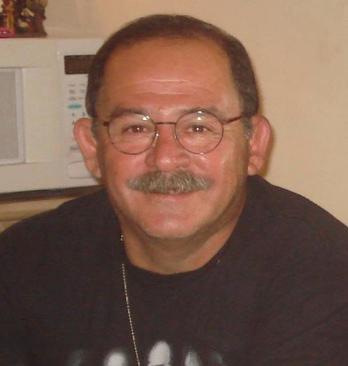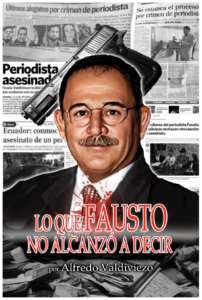Almost 11 years have passed since the murder of Ecuadorian journalist Fausto Guido Valdiviezo Moscoso. No one has been charged in the murder.
His brother believes the crime was not related to his work as a journalist, but that his case has gone unsolved precisely because of his profession.
The Ecuadorian freedom of expression organization, Fundamedios, has called it “emblematic” of the impunity among crimes against journalists in Ecuador.
“The case of Fausto Valdiviezo is an emblematic case for its implications and for precisely revealing this lack of investigation and this lack of commitment on the part of the country's judicial operators and the Ecuadorian judicial system to find those responsible for the murders of journalists,” César Ricaurte, executive director of Fundamedios, told LatAm Journalism Review.
Fausto Valdiviezo’s brother and fellow journalist, Alfredo Valdiviezo, made it his life's goal to investigate the crime until it was solved. He recently published the book “Lo que Fausto no alcanzó a decir” (What Fausto was not able to say) in which, he claims, he not only managed to solve that the killing was due to a personal problem, but also why there was an alleged interest of the State in not thoroughly investigating and solving it.
Although Alfredo Valdiviezo said he believes the perpetrators of the crime were not part of the State, he claims the interest in not solving the case is due to his brother’s profession and the suspicion that someone within the government might have been involved.
“They killed my brother during the time [of then-President Rafael] Correa and they hid the murder. They did everything impossible and possible to prevent the truth from being known,” Alfredo Valdiviezo told LJR.
The murder of Fausto Valdiviezo, which occurred on April 11, 2013 in Guayaquil, shocked the country. With 29 years of experience covering community issues, people sought him out to make their complaints.
Ecuador is not a country characterized by lethal violence against journalists. According to records from the Committee to Protect Journalists (CPJ), three journalists were murdered in the country for possible reasons related to their work between 1992 and 2013. Fausto Valdiviezo’s murder is not on the list.

Periodista ecuatoriano Fausto Valdiviezo asesinado en 2013. (Foto: Cortesía Alfredo Valdiviezo)
However, the reason his case garnered so much attention may have had to do with the notoriety he gained years before because of his difficult relationship with Correa.
This began in 2008, when Correa seized the assets of the Isaías banking family, including the TC Televisión channel where Fausto Valdiviezo worked.
Faced with the imposition of a new administrator, Carlos Coello, the channel’s workers elected Fausto Valdiviezo as the general secretary of the TC Televisión Workers' Business Committee, an entity meant to protect the rights of workers in the midst of that process.
According to Alfredo Valdiviezo, who also worked at TC Televisión, the changes began to be felt from the beginning.
“Our free expression was cut off. We were given an entity to control what we said, what we thought and what we wanted to do. So Fausto was a thorn in the side of that government,” Alfredo Valdiviezo told LJR.
Fausto Valdiviezo was vocal about the things he saw that he believed were affecting the channel. In 2010, for example, through his YouTube account he spoke about the alleged excessive increase in staff at TC Televisión, as well as the increase in the salaries of managers and their travel, as Plan V published.
Fausto Valdiviezo also did not agree with the sale of 30% of the channel's shares to the employees because he considered that they were at a disadvantage.
The channel removed him from being a presenter and he was assigned to be a reporter, but he could not go live. However, it would be the mention from then-President Correa in one of his famous “sabatinas” – nationwide broadcasts that he made weekly – that would mark Fausto Valdiviezo's fate, according to his brother.
On Saturday, July 10, 2010, Correa said about Fausto Valdiviezo: “There is a little agitator out there with bad faith who is misinforming people. TC colleagues, do not let yourself be led by people like this. Have good people, who do not have bitterness in their hearts, who truly seek the good of the workers, the good of TC and the good of the country. Not that seek revenge because he has been put in his place. And not completely, because that bad element of TC Televisión should have been separated.”
Fausto Valdiviezo was asked to resign. The journalist filed a lawsuit, which ended in the company offering a settlement that the journalist accepted. By Aug.16 of that same year he was no longer on the channel.
According to Alfredo Valdiviezo, his brother was shunned by other media outlets. He went more than two years without work, but he was returning little by little through his social networks and other digital media. From there he continued with his reports, and was preparing to return to the media when he was murdered.
On the night of Thursday, April 11, 2013, Fausto Valdiviezo was in his car after leaving his mother's house when hooded men shot him. The journalist was taken to a hospital where he died.
Organizations like Reporters Without Borders and UNESCO spoke out against the murder and demanded that the authorities conduct a diligent investigation that would not discard his journalistic activity as a possible motive.
During his sabatina after the killing, Correa referred to the “tragedy” of the murder and assured that “resources will never be spared to discover the truth.” Four days after the crime, then-Minister of the Interior, José Serrano, ruled out the possibility that the homicide was related to journalistic practice, and there was talk of an alleged link with drug trafficking organizations.
With this hypothesis, the authorities announced the first arrests in May 2013. At one point, six people were charged.
In April 2014, five of them were declared innocent because there was not enough evidence. The sixth defendant was requested for extradition from Colombia, and was later also declared innocent.
For the Valdiviezo family's lawyer, Julio Cueva, the authorities, in their eagerness to show results, presented these people without sufficient evidence and that eventually led to their release.
“When the murder of Fausto Valdivieso occurred, we were close to enactment of a communication law that was highly criticized because it was said to be a gag law. We understand that given the proximity of this law being enacted and the murder of a journalist who had been very critical directly of the government in power, we understand that the government is rushing to make some arrests that from the beginning generated some suspicion," Cueva told LJR.
As Cueva explained, the prosecutor’s office was forced to open a new investigation, during which a person was accused of being the alleged perpetrator. However, that person remains in the U.S. due to his dual nationality.
The Valdiviezo family's lawyer also finds suspicious the changes in prosecutors just before charges are to be filed against people accused of being involved in the crime.

Portada del libro escrito por Alfredo Valdiviezo sobre el asesinato de su hermano, el también periodista Fausto Valdiviezo. (Captura de pantalla)
“That is the state of impunity in the case of Fausto Valdivieso, with the help of the prosecutor's office and the help of the judiciary,” Cueva said.
In the years since the crime, the prosecutor's office has called officials of the Correa government to testify. Even in 2019, the prosecutor's office summoned Correa himself, but he never showed up. Correa currently has a warrant out for arrest in Ecuador and is a fugitive living in Belgium, a country that granted him asylum.
“The case, basically, remains in that legal limbo so that the immediate effect is impunity,” said Fundamedios’ Ricaurte.
Ricaurte, who has not read Alfredo Valdiviezo’s book, criticized the fact that his journalistic work has not been taken into account in his killing.
“In general, there is no awareness among judicial operators, whether they are prosecutors or judges, etc., about the implications of a crime against a journalist and they are not given adequate treatment,” Ricaurte explained.
Despite Alfredo Valdiviezo’s new hypotheses about a possible personal motive, for Ricaurte the impunity in Valdiviezo's crime the “lack of commitment, operability, efficiency and effectiveness of the Ecuadorian judicial system.”
The most recent information available about Fausto Validiezo’s murder on the website of the Attorney General's Office dates back to 2019. In the September statement, the entity said that "it will appeal the sentence that confirms the innocence of the person charged in the murder of Fausto Valdiviezo." However, there is no information on what has happened since then.
LJR requested an interview with the Attorney General's Office to find out the status of the investigation into the killing of Fausto Valdiviezo. The Directorate of Communication and Institutional Promotion reported that the request had been sent to the “respective unit for analysis and response,” however, at the close of this article, LJR had not received another response.